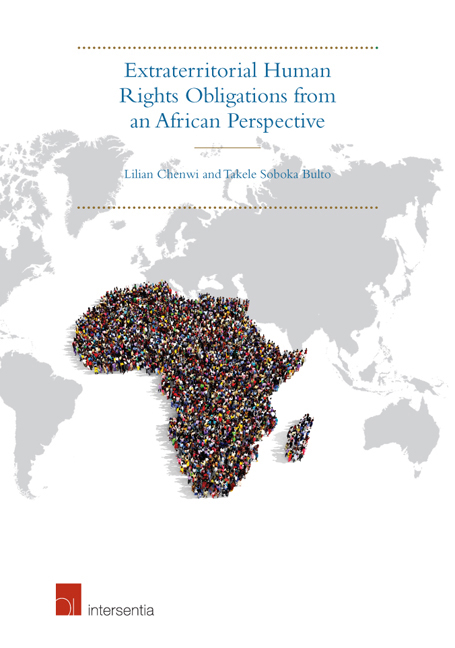Book contents
- Frontmatter
- Dedication
- Foreword
- Preface
- Contents
- List of Cases, Advisory Opinions and Other Decisions
- List of Treaties and Other Instruments
- About the Contributors
- Introduction
- Extraterritoriality in the African Regional Human Rights System from a Comparative Perspective
- Commercialisation of Educational Services and Extraterritorial Human Rights Obligations
- Extraterritorial Human Rights Obligations in the Context of Development Assistance to African States
- The Right to Food Beyond Borders: The Extraterritorial Reach of the Right to Food in Africa
- Extraterritorial Application of the Right to Water under the African System for the Protection of Human Rights
- Tortured Unity: United States–Africa Relations in Extraordinary Renditions and States’ Extraterritorial Obligations
- Indigenous Communities Displaced by Climate Change and Extraterritorial Application of States’ Obligations in Africa
- Land Grabbing, Extraterritorial Obligations and the Failure of Justice in Uganda: The Mubende Case
- Extraterritorial Obligations of Uganda for its Military's Failure to Respect and Protect Civilians in Areas of the Lord's Resistance Army Activity
- Bibliography
- Index
Extraterritorial Human Rights Obligations in the Context of Development Assistance to African States
Published online by Cambridge University Press: 21 September 2018
- Frontmatter
- Dedication
- Foreword
- Preface
- Contents
- List of Cases, Advisory Opinions and Other Decisions
- List of Treaties and Other Instruments
- About the Contributors
- Introduction
- Extraterritoriality in the African Regional Human Rights System from a Comparative Perspective
- Commercialisation of Educational Services and Extraterritorial Human Rights Obligations
- Extraterritorial Human Rights Obligations in the Context of Development Assistance to African States
- The Right to Food Beyond Borders: The Extraterritorial Reach of the Right to Food in Africa
- Extraterritorial Application of the Right to Water under the African System for the Protection of Human Rights
- Tortured Unity: United States–Africa Relations in Extraordinary Renditions and States’ Extraterritorial Obligations
- Indigenous Communities Displaced by Climate Change and Extraterritorial Application of States’ Obligations in Africa
- Land Grabbing, Extraterritorial Obligations and the Failure of Justice in Uganda: The Mubende Case
- Extraterritorial Obligations of Uganda for its Military's Failure to Respect and Protect Civilians in Areas of the Lord's Resistance Army Activity
- Bibliography
- Index
Summary
INTRODUCTION
The granting of development assistance – also referred to as development aid, official development assistance (ODA) or international/foreign aid/assistance for development – is an extraterritorial activity that several countries, particularly richer or developed countries, are involved in. Internationally, there is no single agreed definition of what development assistance comprises. In simple terms, it is money from rich countries to poorer ones, aimed at helping them develop, or as Skogly puts it,’ a direct transfer of public funds from one state to another state’. Minoiu and Reddy define development aid as’ aid expended in a manner that is anticipated to promote development, whether achieved through economic growth or other means’. While coining the term ODA, the Development Assistance Committee (DAC) of the Organisation for Economic Co-operation and Development (OECD) defines it as’ those flows to countries and territories on the DAC List of ODA Recipients … and to multilateral institutions’ that are’ provided by official agencies, including state and local governments, or by their executive agencies’, with the’ main objective’ of’ the promotion of the economic development and welfare of developing countries’. The United Nations (UN) Economic and Social Council (ECOSOC) has elucidated the DAC's definition by identifying the following criteria for ODA: a government or its agency is the donor; a developing country government or a multilateral development institution 5 is the recipient; the purpose of the funding is the promotion of economic development and welfare; the [financing] flows can be costs of education given to nationals of a developing country in the donor country, programme and project assistance, subsidies to NGOs, humanitarian assistance, administrative costs of ODA programmes, debt relief, and programmes to raise development awareness in donor countries; and, if a loan, it must be deemed concessional to qualify as ODA.
Development assistance could be bilateral or multilateral – the former refers to ‘flows from official (government) sources directly to official sources in the recipient country’ ; and the latter to’ core contributions from official (government) sources to multilateral agencies where it is then used to fund the multilateral agencies’ own programmes’.
- Type
- Chapter
- Information
- Publisher: IntersentiaPrint publication year: 2018



